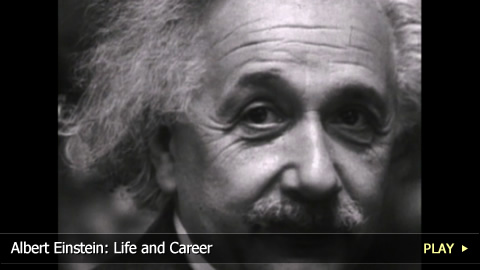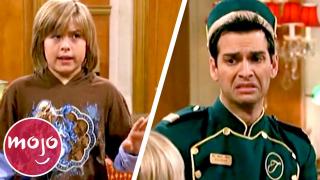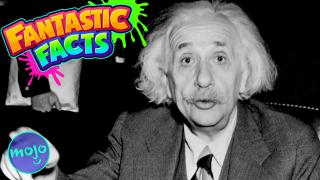Albert Einstein: Life and Career

Early Life
Top 10 Times Celebs Celebrated Too Early at Award Shows
Born March 14th, 1879 in Germany, Albert Einstein’s early scientific interest can be traced to a simple compass he was shown at the age of five, which prompted him to wonder what controlled its movement. By age ten, he was given important readings in mathematics, science and philosophy to nurture his talents. While at school Einstein excelled in certain subjects, though his boredom made him appear lazy to many of his teachers.
Work as a Patent Clerk
Top 10 Disney Channel Jokes That Would Not Work Today
Upon graduating at the turn of the twentieth century, Einstein unsuccessfully sought a teaching job. Instead, he eventually secured employment at a Swiss patent office, which allowed him enough spare time to continue his scientific research and studies. His work there centered on electromagnetic devices, and this greatly influenced his later ideas and theories.
The Miracle Year
ALBERT EINSTEIN! - Fantastic Facts
1905 was a huge year in Einstein’s career, and it has since been labeled his “Annus Mirabilis” or “miracle year.” It was the year the scientific community took notice: he was awarded his PhD by the University of Zurich, and published four landmark papers during that period. These papers went on to build the foundation of physics, and alter the accepted perceptions of space, time and matter. This was also when he introduced the most famous equation of the twentieth century: e=mc2, in reference to the relationship between the mass and energy of a certain object.
Professor Einstein
Professor Marston and the Wonder Women Review! Top 5 Surprising Takeaways
Within three years, Einstein’s reputation as a foremost scientist helped him become a university lecturer. Soon after, he quit that and his job as a patent clerk to rise through the ranks and become a full professor, which he achieved in 1911.
The General Theory of Relativity
The Amazing Life & Career of Judge Judy
He continued within the world of academia, and in 1919 he became world famous when a theory he had put forth years earlier was effectively proven true. His general theory of relativity further explained the forces of gravity, and made him a successor to Isaac Newton in the world of physics.
Nobel Prize in Physics
Top 10 Nobel Prize Winners
In 1921, Einstein was honored with the Nobel Prize in Physics for his explanation of the photoelectric effect of quantum mechanics, which helped clarify the nature of light. He was subsequently treated as a veritable celebrity on his travels around the world, and throngs of fans gathered to hear him speak.
Social and Political Causes
Top 10 Celebrity Social Media Blunders
His fame allowed him to help further his social and political beliefs. However, his status as a Jew made him a target for the rising Nazi Party. By 1933, he was no longer able to teach in Germany, his works were being burned, and he was even targeted for assassination. A well-known pacifist with Zionist beliefs, Einstein decided to move to the United States that year and settled at New Jersey’s Institute for Advanced Study.
The Manhattan Project
The Shocking History of Oppenheimer's Bombs - The Manhattan Project
In 1939, Einstein went against his pacifist leanings to alert the American government to the possibility that Hitler and his forces were creating nuclear weapons. Initially skeptical, President Franklin Delano Roosevelt eventually conceded and the Manhattan Project materialized. This was the mission that saw the development of the first atomic bomb. The next year, Einstein became an American citizen. He was also a prominent member of the NAACP, or National Association for the Advancement of Colored People, and was part of the battle for civil rights in the U.S.
Turns Down Presidency of Israel
Top 20 The Voice (U.S.) 4-Chair Turns
In 1952, as one of the world’s most prominent Jews, Einstein was approached by the Israeli premier to become the second president of the newly formed state of Israel. He declined, claiming he lacked the people skills necessary for the job.
Unified Field Theory
Einstein’s later years were spent trying to discover a unified field theory that would explain the basic forces of nature and the Universe in one framework, or – essentially – a theory of everything. However, he was unable to do so before his death on April 18th, 1955 from internal bleeding caused by an abdominal aortic aneurysm. He worked tirelessly until the end of his life, and even brought with him a speech to finish on his final hospital trip.
Legacy
Top 10 Scariest Kaiju On Monarch Legacy of Monsters
Albert Einstein is not only remembered as one of the fathers of modern physics and perhaps the most famous scientist of the twentieth century, but also as an unpretentious genius who never lost his childlike sense of wonder.


 0
0
 0
0
 report
report










